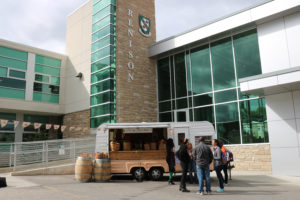If the fruits you grow and pick could speak from dinner tables, refrigerators, and grocery aisles, what would you want them to say?
This question was the same that planted the seed of thought into the mind of artist, Farrah Miranda, as she began to explore the plight of migrant agricultural workers across Southern Ontario.
The idea sprouted the project, Speaking Fruit. Tended to by the Toronto-based artist and Renison’s Professor of Social Development Studies Craig Fortier, this interactive art installation finally came to fruition, just in time for the Canadian Student Leadership Conference on Thursday, Sept. 28.
This unique art installation, set up outside of Renison, allowed participants to experience an original soundtrack and encouraged them to engage in its virtual reality, displaying a dance performed by farmworkers themselves.
Most of all, it begs individuals to question migrant farmworker rights, or rather, their lack thereof.
The project itself is housed within a mobile fruit stand caravan. It is, in its most literal sense, a movement in motion.

On Thursday, Miranda explained that migrant farmworkers have few rights and lack status, which results in an inability to speak up.
“[They] fill a temporary labour market need but this need is not temporary because it’s been going on for 50 years,” Miranda says.
She elaborated on how projects are impossible without its connections. Farrah Miranda remembers the first time she felt utterly moved by one of the dances, choreographed by Heryka Miranda, “I was seeing [a man in his 50s] not just as a migrant farmworker, but as a dancer and an artist.”
But Miranda was not the only one to voice an opinion at the event.
Gabriel Allahdua, a former migrant farmworker originally from St. Lucia, attended Speaking Fruit to spread the hidden reality of agricultural inequity. He stressed the 20 injustices that go into every fruit and vegetable produced once a migrant worker is involved.
“Can you believe that in Canada, the land of freedom, it is illegal for migrant farmworkers to unionize?” he asked.
Allahdua expressed that although these policies bind so many migrant workers, it gives him hope that they’re only man-made, passionately urging everyone to do something: “At the root of our problems are the policies. But… it might also be you and me when… we do nothing about it. This project here, it connects the hands of the people who produce our food, with you, [the ones] who consume the food.”
The team behind Speaking Fruit is now continuing to scatter seeds of discussion through questions from migrant farmworkers, daring readers to speak up and challenge their policy-makers with the hashtag #SpeakingFruit.
“At many moments during this project, I’ve realised something basic that all of us should know,” Miranda reflected. “A migrant farmworker isn’t just a worker – they’re people with hopes and dreams and aspirations.”





























